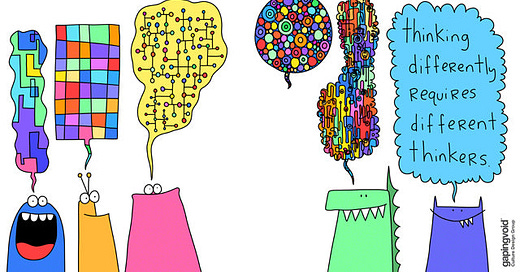One of the tragic mistakes of organizations is aiming to increase well-being instead of demonstrating how well-being is supported. Well-being and diversity initiatives matter less than how they are interpreted.
The culture reflects the values, norms, and assumptions that guide behavior in a social group.
The climate is how people feel about the culture.
If people feel the climate is inhospitable to diverse ideas, the groups they are part of lose intellectual capital. Here are six fears that prevent groups from extracting the unique insights and knowledge of group members.
People fear their ideas will be stolen.
People fear they will not get credit for contributions.
People fear unjust criticism.
People expect misunderstandings.
People believe it is unacceptable to question the mainstream values and beliefs of the group.
People assume there will be insufficient opportunities to share ideas.
What I’ve been interested in is how to help humans get over their hardwired fear of change and change-makers.
The greater conformity within a group, the more essential dissenters become.
Building on these thoughts about group dynamics, enjoy a short answer to the question of what differs when culture change occurs not from leaders but from individuals at the bottom or middle rungs of the social hierarchy.1
The best way to support me is to spread the word & share this issue. And click the free ❤️ button. For more on creating stronger, wiser groups, read The Art of Insubordination: How to Dissent and Defy Effectively.
And to get in touch, email me (todd[at]toddkashdan.com).
Additional Curiosities
Read the new book on The Power of Play: Optimize Your Joy Potential by my beloved friend Dr. Elaine O’Brien and Andrea Seydel. Play is an underestimated quality. There is no better time than now for adults to recapture the missing piece in the public conversation on burnout, work-life integration, quiet quitting, and all the rest. Insert some of their suggestions into your world.
And If You Missed the Last Issue…..
I appreciate feedback to my issue on the science of parenting - how good or bad do caregivers have it? Do the benefits differ between moms and dads? Make sure to share the link below with people who have kids, are deciding, or are the underappreciated souls caring for the next generation in other roles.
Most of us despite social hierarchies as they remind us of picking teams in middle school gym class. Social hierarchies are unlikely to disappear in the next few generations. It’s a byproduct of individual differences in temperament, personality, intelligence, skill, knowledge, attractiveness. Diversity is a strength and also a differentiator. We all possess different jagged profiles. What is more likely to be changed are the features emphasized (and de-emphasized) in a social hierarchy. To gain traction toward more aspirational groups, focus on what can be transformed with ease that leads to healthier outcomes (with careful consideration of the unintended consequences that might arise from tinkering).






I have to believe you would enjoy this book:
Two Heads (https://www.simonandschuster.com/books/Two-Heads/Uta-Frith/9781501194078)
-which is a long-form science comic that more or less buuilds up the same exact argument you've outlined here, about how diversity withint a group is provably the best way to go.